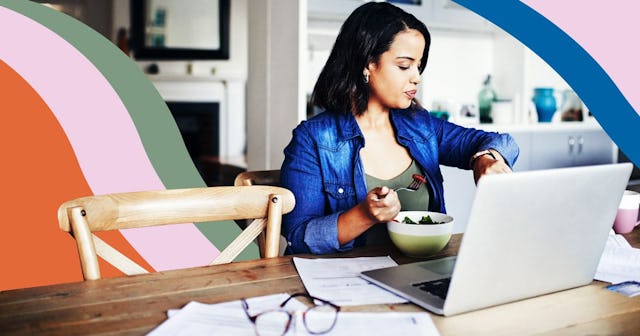A Global Pandemic Is No Time For Your Fatphobia

If you’re worried about your weight during a global pandemic, it’s because you’ve been brainwashed by diet culture.
You’ve seen the memes, they’re all over social media. “Before quarantine, after quarantine” and a before-and-after style photo of a woman (it’s always a woman) who is noticeably thinner in the “before” photo. The videos of people working out to avoid gaining the “Quarantine 15.” The jokes about “keeping six feet away from the fridge.”
There is a global pandemic unleashing new horrors and rising death tolls every day, and people sharing these memes are also indirectly sharing that they’d rather be exposed to the virus than gain a few pounds.
If you are worried about gaining weight right now, blame diet culture. We’ve all been conditioned to tie our worth to our weight, and, unfortunately, this pandemic is showing us just how prevalent that level of conditioning is.
I’m urging you: if you’re so hyper-focused on avoiding weight gain during this time of crisis, please think before you post something like this. We’re stressed to the max and trying to adjust to this new “normal,” where even a trip to the grocery store gives us apocalyptic levels of anxiety. We’re home-schooling our children while still working ourselves. We’re missing our friends and families. We’re inundated with images of refrigeration trucks carting dead bodies out of hospitals.
We need the freedom to cope however we want to cope.
Here’s what we don’t need: #SayNoToQuarantine15 quinoa recipes or push-up videos or — perhaps worst of all — companies pushing diet products on extra vulnerable people right now. We do not need to feel shame about snacking or sitting on the couch right now; for many of us, that’s how we’re coping.
Maybe your coping mechanism is exercise and structuring the way you eat. If you’re going to post about it in a way that makes people feel worse about not exercising or eating the way you eat, here’s an idea: don’t.
Being thin is not an indicator of health, and COVID-19 definitely doesn’t care how “healthy” or “fit” you are before it wreaks havoc on your body and fills your lungs with fluid. Doctors and teenagers and marathon runners are being intubated. They’re dying. And the coronavirus doesn’t care how many miles they logged on a Peleton bike or whether they still fit into their “pre-quarantine” jeans. This virus does not care how many times you substituted mushy cauliflower in place of pizza crust or macaroni.
Realizing we ultimately have no control over how this pandemic affects us is a difficult pill to swallow. It’s only natural to find ways to exert control over things like food and exercise when there’s quite literally not much else to do.
Doing it at the expense of fat people is grotesque.
And, because there are going to be lots of “devil’s advocate” commenters telling on themselves, let me lay it out for you. There is a huge difference between “sharing this photo of my run today” and posting things like “socially distancing from junk food right now so I don’t get fat.”
The former is perfectly harmless, if utterly banal. The latter suggests that having a larger body — like lots of people who follow you on social media — is one of your biggest fears. Right now, of all things.
https://www.instagram.com/p/B-LzGzhhTD5/
When social media posts show us “how to eat less processed foods” or “sign up for online workouts” packaged in a way that urges people not to give in to — GASP — gaining weight during a time of enormous anxiety, that’s fatphobic. What that tells me, personally (and it’s impossible not to internalize this message), is that my body is someone else’s fear. It’s also sending the message that people in larger bodies do not eat healthy and/or exercise, which is also a lie diet culture loves to spread.
On a grander scale, fatphobia — beginning as “harmless” jokes and memes — lays the foundation for why overweight people could be less likely to receive lifesaving treatments during this crisis. Weight bias in healthcare is widely-noted and highly prevalent , and healthcare professionals (even ones specializing in obesity) have been shown to both endorse and display weight bias at an alarming frequency.
Anastasia Pelikh/Getty
So many of us struggle with disordered eating. Living, working, and parenting through a pandemic is only exacerbating this struggle. We’re supposed to all be in this “together,” but this virus is highlighting the many different disparities that exist between us through class, gender, race, and, of course, fatness.
Posting these types of memes or regularly sharing how you’re “avoiding” fatness while staying at home is also telling anyone who doesn’t eat like you, exercise like you, or look like you that they’re less than. You can disagree, but your impact speaks louder than your alleged intent.
Please don’t use a global pandemic as an excuse to be fatphobic. Doing so doesn’t mean you’re funny, original, “concerned,” or relatable. It means you’re a shortsighted asshole who is directly contributing to weight bias during a mass casualty event.
Don’t be that person.
This article was originally published on